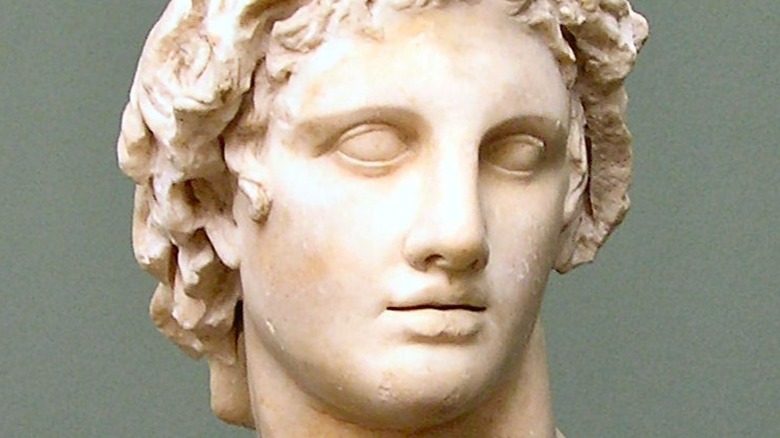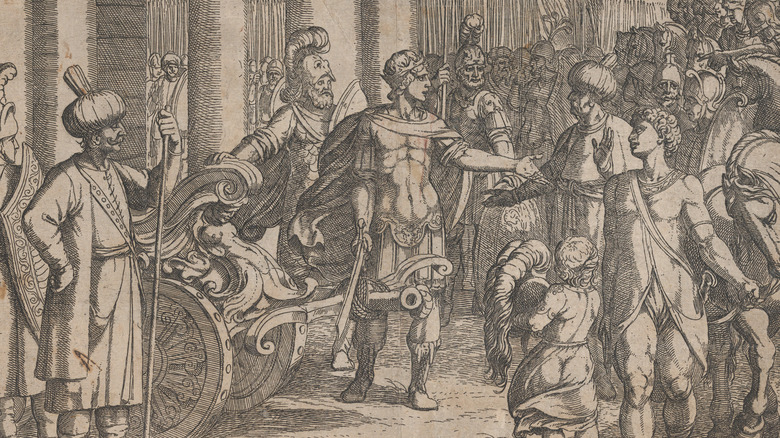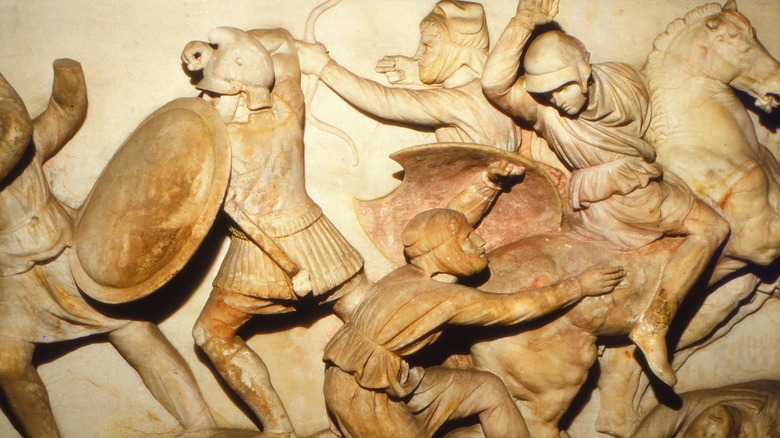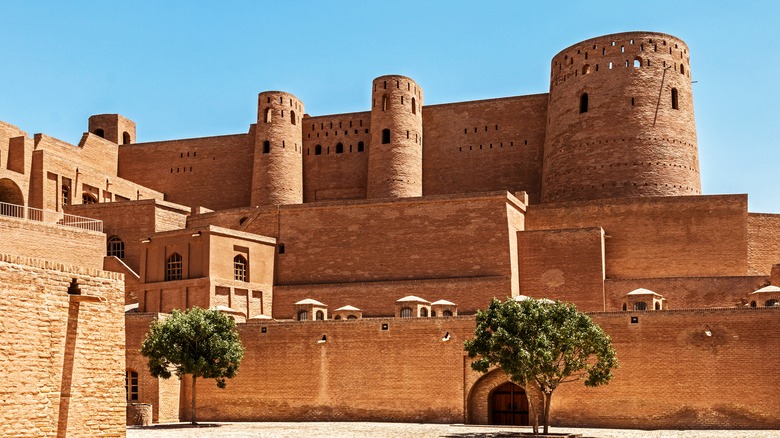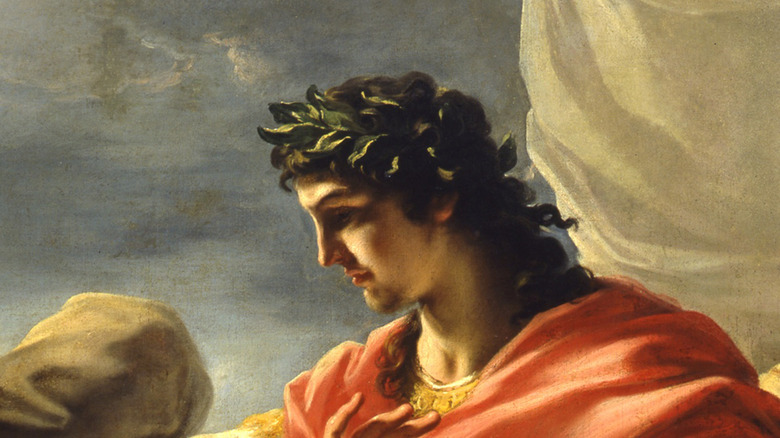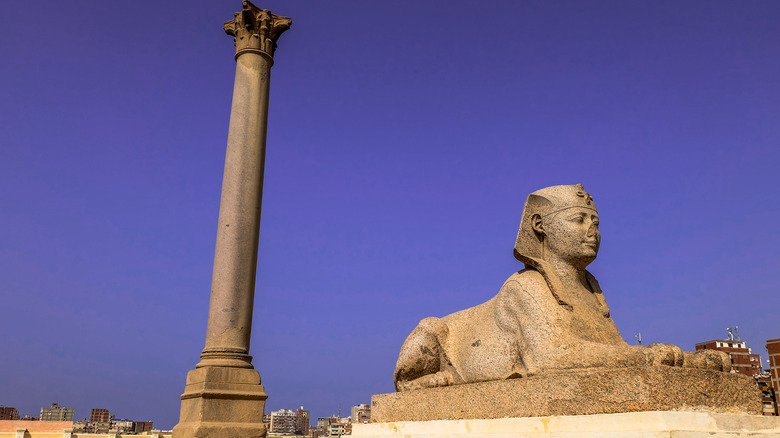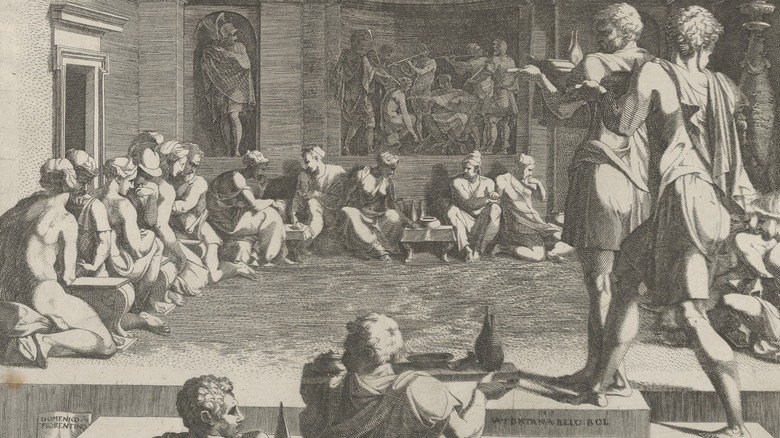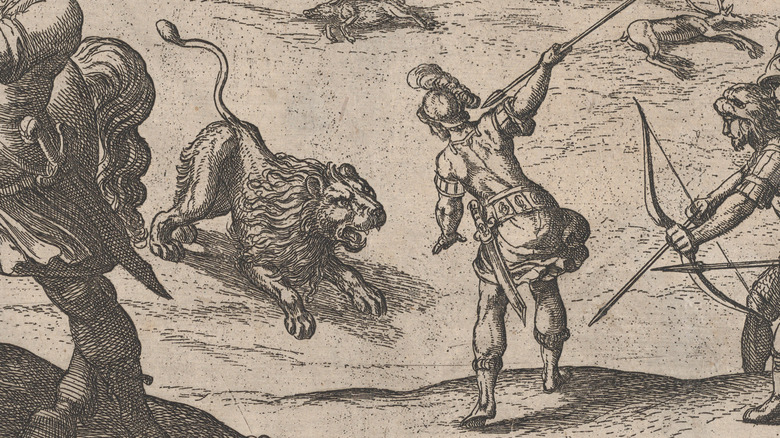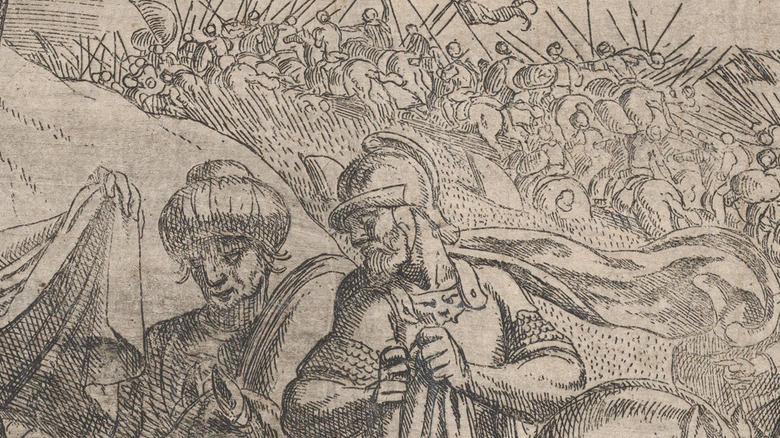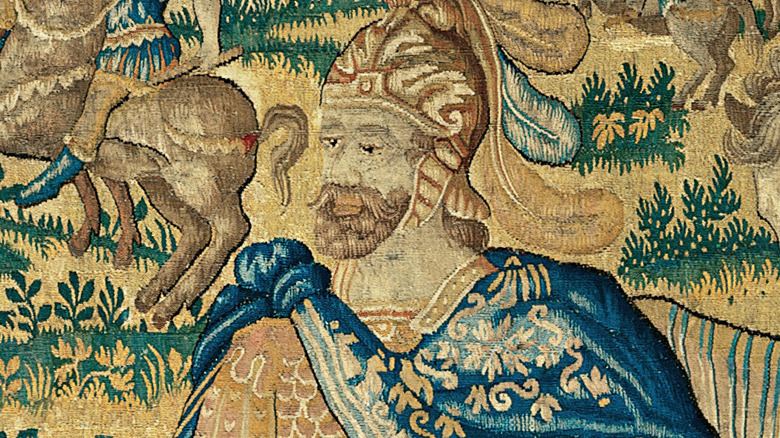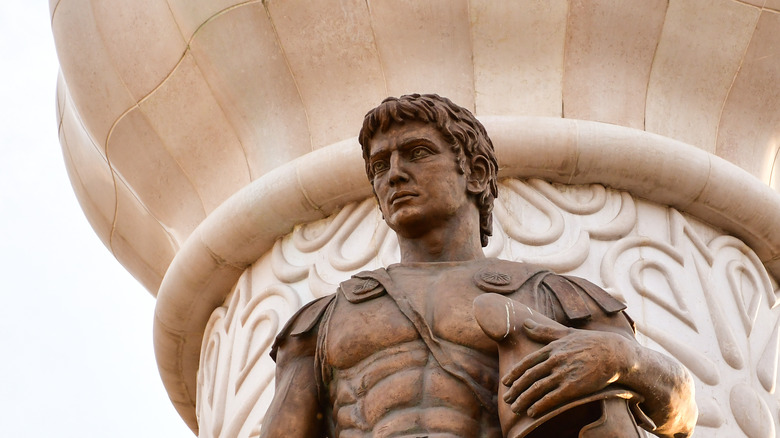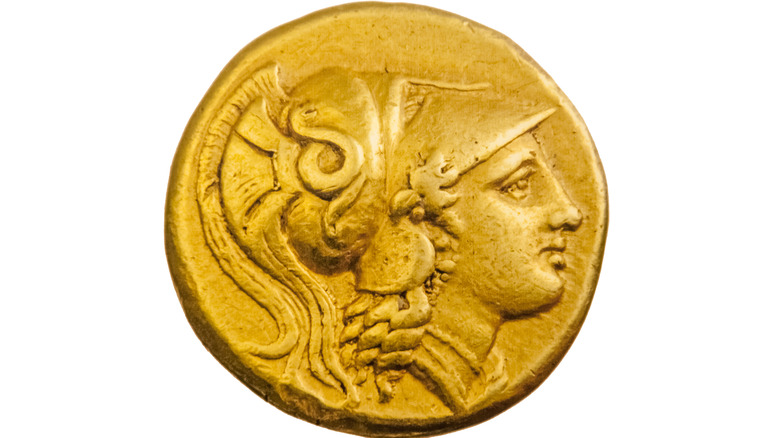You May Not Have Realized How Rich Alexander The Great Actually Was
You don't earn the moniker "the Great" by being mediocre, and Alexander the Great was no exception. Born into a fortuitous situation, Alexander was determined to become the king of all of Asia, according to The Richest, and this spurred him to gather the vast resources of Macedonia and set off to do exactly that. Widely regarded as one of the greatest military tacticians of all time, Alexander may well have found his immensely successful — albeit somewhat brief — military campaign to be something of a cakewalk, though it didn't last forever.
Like far too many hotshot celebrities, Alexander's star burned out far sooner than he would have liked. He was only 32 years old when he died, and having appointed no successor, his empire fractured and was split up, according to World History Encyclopedia. That includes his wealth, which he had already given freely to his supporters and kinsmen, but after his death this was redistributed along with his lands, having no established line of his own to inherit them.
Whatever the case, at his peak, Alexander's wealth is quite literally unmeasurable. It involved so many different sources and, given how long ago this was, it's as much a guessing game as it is to adjust for modern inflation. Nonetheless, the end result is that he was filthy rich, broadly speaking, perhaps beyond anyone's comprehension. Let's explore where that wealth came from, and how much he may have been worth in the end.
Starting young helped him immensely
You might say that Alexander was built to be great. From a young age, as the son of the king, he was taught all the valuable skills that could make any youth a future "great." This included being taught to ride and fight, read and write, play music, and more, according to World History Encyclopedia, and even being tutored by Aristotle himself. Essentially, from his boyhood days, he was exercising his brain and body to prepare for the destiny that awaited him. So when he took the throne at the ripe old age of 20, he had all the skills necessary to succeed. He also had everything his father, King Philip II, left him.
While some of that was debt, a lot of it was also a vast amount of natural resources within the borders of Macedonia, such as its gold and silver mines. One mine in particular, according to The Richest, was responsible for generating the modern-day equivalent of $933 million annually. Now granted, that didn't all go straight into Alexander's pockets, but was still a hefty chunk of change. It certainly didn't hurt him when the time came to rise up and go claim more treasure throughout Asia.
He struck gold — a lot of gold
Never mind that Alexander the Great inherited gold, Alexander's first brush with extreme wealth came very early into his conquests, particularly that of Persia. It had long been Philip II's goal to invade Persia, according to World History Encyclopedia, so Alexander picked up where he left off: He vanquished Persian King Darius and made himself King of Persia, a move that would bring about more riches than he could have ever fathomed.
According to "Alexander the Great: The Story of an Ancient Life," the wealth accumulated from the Persian invasion couldn't have been better timed, since the war was expensive. Alexander wasn't one to hoard, so he sent payment home to assist in covering the losses of Macedonian soldiers and resources. As far as how much wealth this invasion netted him, the numbers are so big that it's hard to even imagine. According to "Alexander the Great: The Story of an Ancient Life," the spoils from Persia as a whole racked up $1.6 trillion in worth (valued in 2013), which were claimed to have required 20,000 mules and 5,000 camels to haul back to Macedonia.
This was a major turning point, in that Alexander no longer had to worry about funding for his military expedition. His campaign in Persia had covered it with room to spare, and Alexander had officially vaulted into the company of the richest people in history.
Alexander the Great protected his wealth
History has an abundance of rulers who invaded other countries, sometimes more than one, and cobbled together something resembling an empire — in that regard, Alexander the Great is not that special. But to have amassed the wealth and power that he did, Alexander had to do something a bit out of the ordinary, and he did so on multiple levels. One of the first ways he protected his assets, including his wealth, was by constructing cities and castles as hubs where his empire could thrive around. His castles were so sturdy that some of them still stand today, including Herat Citadel (via Lonely Planet), and what is now known as Ball Haizer (via U.S. Air Forces Central).
Alexander also founded 70 different cities all by himself — all named after him — according to History.com. He also built shrines to his conquests to fuel the support base that he built for himself, despite conquering many independent communities. Which ties in further to protecting his wealth — he took care to not irk the native populations any more than a conqueror might need to.
He avoided scorching the earth
While Alexander certainly had a cruel streak for populations who resisted him, this wasn't a policy that he held across the board. He knew when to take a conquered culture and add it to his own, and nowhere is this seen better than in Persia. According to "Alexander the Great: The Story of an Ancient Life," Alexander had a very valuable ability and impetus for getting to know the culture of his conquered foe. In that sense, he didn't necessarily disrupt their everyday life, and in many ways he brought added security and wealth to conquered states, simply by bringing Macedonia to them.
In the case of Persia, Alexander became the King of Persia himself, governing it as any other king would. He dressed like the Persians and adapted their customs so much, in fact, that some Macedonians were worried that he had gone full Persian. In the end though, this helped secure his base of support in Persia. He did the same thing in Egypt, according to "Alexander the Great: The Story of an Ancient Life." He consulted with Egyptian priests and priestesses in an effort to ensure sustainable security for the Egyptian people, as well as a reliable additional source of income for his already wealthy empire.
Alexander the Great established new trade routes
Alexander did a tremendous job in adapting to other cultures and religious practices throughout his conquests, but he also didn't wantonly found cities and fortresses. They weren't just vanity projects, they were also trade centers for his empire, and it was under his careful administration that trade erupted throughout the Macedonian Empire. In so doing, he created even more reliable sources of wealth, from locations that were previously beyond his grasp. Like most things with Alexander, the center of all of this was Persia. According to Khan Academy, Alexander bolstered the Persian economy by injecting vast sums of his plunder into it, stimulating a massive surge in commerce over far-flung regions.
As far as how his own cities contributed to trade, there is no better example than the city of Alexandria in Egypt. Khan Academy notes that this city became the central trading hub of an empire that stretched into Africa, Asia, the Middle East, and back into Europe. With its sensible design and accessible ports, it was crucial in keeping the wealth moving and flowing, as Alexander continued his conquests.
He invested his wealth wisely
Some of the wealthiest people in history are also some of the most generous, such as William the Conquerer. They gave freely to their kinsmen and supporters, which kept them in positive standing — Alexander was no different in that sense, and never took all the spoils for himself. As can be seen in his conquest of Persia, via "The Treasures of Alexander the Great: How One Man's Wealth Shaped the World," he took the wealth, reinvested it, and spread it around to ensure that the nobility and all those close to him were kept happy. Indeed, in Persia Alexander's spending was so lavish, that some estimates theorize that no economy would again see such an influx of wealth until the Spanish gold hoard in America, almost two millennia later (via Khan Academy).
In one specific instance, according to the Richest, Alexander even shelled out $625 million to buy a kinsman a mansion. This was just one example of how he kept his underlings happy, which was a common trend among other conquerors such as William the Conqueror, Genghis Khan, even Napoleon — they knew when to give the right rewards to the right people.
Alexander the Great was strict when he had to be
Despite being ridiculously wealthy and incredibly generous to boot, Alexander the Great had his work cut out in protecting that wealth — both from conquered populations, which he largely accomplished by not interrupting daily life and customs, and from his own forces. For as generous as he was, there was also a strictness to Alexander that kept his army in order, for fear of the consequences for stepping out of line.
One instance of this occurred when Alexander began adopting Persian court customs, much to the chagrin of some of his Macedonian generals, according to History.com. After an attempted assassination attempt by General Parmenio's son Philotas, Alexander had them both killed out of paranoia. A similar instance occurred when another general, Cleitus, overly ran his mouth about Alexander behaving too Persian, as well as slighting him and his achievements: Alexander took a spear and impaled Cleitus himself.
While this wasn't too positively viewed by many of his army, and contributed to a future mutiny after the invasion of India, Alexander was no pushover, nor would he stand the insubordination of his men — for better or for worse.
Alexander the Great never lost a battle
It's no secret that losing can be more expensive than winning: You lose more soldiers, land, and perhaps treasure. Whereas when you win, you gain land, treasure, and power. Seeing as how Alexander never lost a single battle, according to History.com, it stands to reason that he profited immensely from his successes by simply never suffering any such loss, not to mention the blow it would have been to morale, which may have hindered his ability to continue on the road to riches that he had set himself on.
His conquests started when he was just 18 years old, after which he fought battle after battle without a single defeat — for 15 years. When his conquests did run their course, it was because of desertion and mutiny, not because of any superior foe. Simply put — that's because there was no superior military opposition to Alexander at the time. Had his army never faced any internal struggle, it's mind-boggling to consider how much land, and therefore how much wealth, he could have acquired over decades of expansion.
He made an example of those that opposed him
Alexander the Great had one rather unpleasant parallel with Genghis Khan — the whole "I'll give you a chance to surrender and join peacefully" policy that, if refused, led to some serious consequences (via Britannica). According to World History Encyclopedia, this can especially be seen in his handling of the city of Tyre. They held out and fought back, so when Alexander took the city, he massacred the survivors after the battle and sold a great host of them into slavery. These cruel actions of Alexander were also highly profitable for him.
For the accumulation of wealth, this was a very valuable policy to have, and it served conquerors like Alexander well. If a city or castle held out against Alexander and he massacred the entire population, he could then claim literally everything they owned, and add it to his riches without any more trouble. If, however, they gave in peacefully and accepted Alexander's rule, he would still benefit from whatever wealth they possessed and continued to accumulate on their own, just by adding it to his blossoming empire.
So how much was Alexander the Great actually worth?
How much was Alexander the Great worth? This is a tough question to answer, because the estimations vary so greatly. Some say $500 billion (via The Richest), and some say as much as $32 trillion (via CAKnowledge.com): The actual answer is probably somewhere in between. Alexander didn't exactly keep a Domesday Book like William the Conqueror, and many of the records have been lost to history, so a lot of this is estimation. Consider that, according to "The Treasures of Alexander the Great: How One Man's Wealth Shaped the World," even the hauls from various conquests throughout Persia differ, depending on the source.
Which circles back to the question — how much was he actually worth? Well, a simple approach is to guesstimate the center point of the high ($32 trillion) and the low ($500 billion), but even that is a range built on estimates. Either way, Alexander the Great was filthy rich. From one military clash alone, where at the battle of Issus he defeated King Darius III of Persia, he racked up the equivalent of $2.8 billion (via The Richest). That should at least give a starting point of what he's worth, skewing upwards to account for taxes, trade, and many further conquests.
How Alexander the Great ranks among the historical rich
What makes Alexander's wealth so interesting is that you won't see him on many "wealthiest in history lists." Money compiled a list of 10 of the richest people in history and, despite an accurate calculation of what everyone else is worth — at least as accurate as possible — Alexander does not make an appearance. However, sitting second on that list, right behind the incalculably wealthy Mansa Musa, is Augustus Caesar, with an estimated worth of $4.6 trillion. Knowing what we do of Alexander's $1.6 trillion haul from Persia (per The Richest), and the wealth gained from his Egypt conquest, as well as from the natural resources of precious metals in Macedonia, and the various trade routes he opened up, that Alexander should have netted a worth at least somewhere close to the Roman emperor Augustus. According to The Richest, the precious metals alone brought in $933 million a year, so even though Alexander died young, he still ruled for 13 years, meaning he would have collected an additional total of over $12 billion from that source alone.
The other names behind Augustus are Emperor Shenzong and Akbar I, both of who had incalculable wealth according to multiple sources, such as Money and GQ), but then Andrew Carnegie appears at fifth on such lists with $372 billion. Even the lower estimates of Alexander the Great puts him above that, so, for lack of greater specificity, Alexander ranks somewhere between second and fourth on the all-time richest people in history list.
